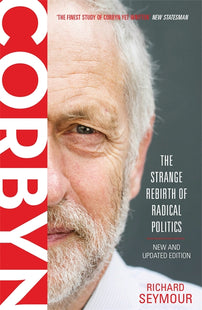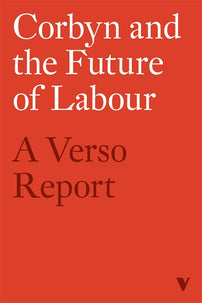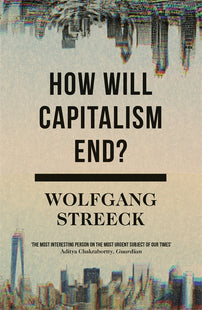For the Many, Not the Few
The German Left needs a new road out of the false alternatives of renationalization and humanitarian cosmopolitanism.

Originally published in Die Zeit on 31 January 2018. Translated for the Verso Blog by Darren Roso. Thanks Loren Balhorn for suggestions.
Where does the crisis of the Left come from? It absorbed the mantra of "there is no alternative."
It is tragic. Western capitalism burns with fever and coughs uncontrollably, yet no doctor stands by its side — only the lobbyist of a pharmaceutical company. Technically speaking, this represents a decent starting point for the Left. But only in theory, because it is weakened and off-balance. The crisis of the left began long before the refugee crisis. It has resigned itself to capitalism — and is more fragmented than it has been in years for precisely this reason.
More than anyone else, the Social Democrats appear to be stuck in quicksand, with every gesticulation they make drawing them further into an abysmal trap. Should they fail to find a path to renewal, the fate of their European sister parties threatens the SPD as well: the irrelevance of social democracy in France, Italy, the Netherlands or Greece no longer looks that far off. The Left Party is not caught in the same existential crisis, it has held its own. But it has lost momentum, while the Alternative für Deutschland has taken its place as the main oppositional party.
In the Left Party, the discontent is so great that a "new left-wing people’s party" comprising the disaffected elements of the Left, SPD, and the Greens is being called for. Politically, such a call is dubious, because the initiative is fundamentally a means of conducting an internal power struggle within the party. Because ultimately, it is the very principle of the "people’s party" that is in crisis — literally, their basic obligation to be ideologically thin and focused on maximizing power has alienated many voters from the old people’s parties. A new coalition of the left would represent no alternative.
More meaningful are the political orientations that are being fought over. On this point, the underlying problems of the left-wing parties reveal themselves: a dualistic mode of thinking has supplanted the dialectical art. In each case, the contradictions of reality are resolved one-sidedly, rather than dealing with the contradiction itself. On the one hand, Sahra Wagenknecht and Oskar Lafontaine seek to strengthen the state against globalization’s vortex with a renationalization of the body politic. With this orientation, they are trying to counter the Siren’s lure of nationalism — which so many people now yield to — with the alternative of national and democratic sovereignty. In the SPD, Sigmar Gabriel campaigns for a new concept of the homeland [Heimat]. On the other hand, libertarian cosmopolitanism is on the rise. With the moralistic superiority of the globetrotting humanist, supporters of this libertarian cosmopolitanism deem the welfare state and the exclusive standard of living that the lower classes have obtained in wealth Germany essentially as privileges fortified beyond the reach of the people of the Global South.
The dualism of left-wing thought also reflects itself in the conflict over identity politics, the struggle against the discrimination of individual groups and their right to recognition. Some align with the conservative narrative that the Left has lost contact with the left-behind parts of society. The critics of identity politics think in kind of discursive communicating vessels when demanding to place even more stress on the social question and less on identity politics. They forget that the whole history of left-wing movements, not forgetting the early labour movement, revolved around the question of identity, recognition, autonomy, and dignity — and yes, even pride. Social inequality was explained as a barrier to the attainment of these demands. The problem of the identity politics of recent years does not reside in its alleged excesses (sexism, for example, clearly remains a colossal social problem), but in the lack of appreciation for vertical social inequality. One fights for women’s parity on corporate supervisory boards, but not against the atrocious working conditions for women in the service-proletariat.
The Left Itself Has Become Part of the Establishment
The malaise of the Left has its origins in the fact that it has lost the imagination for another, better world and abandoned the resolve to reach it. The Left has absorbed into its very core the neoliberal mantra that there is no alternative to global capitalism. It is thus no longer a force for the future, not a driver of progress, nor source of stamina for great reform efforts. They have no social narrative of their own that breaks the horizon of universal competition, limitless growth, environmental destruction, or the dissolution of local communities in which every pore of life is made a commodity. In terms of their basic programmes — whether socialist or anti-capitalist — the Left exists only on paper. No longer does it think in terms of social antagonisms. In this sense, it has become conservative. It seeks to preserve the old socially regulated capitalism, although the rush of social change has eroded it from within so far as to have already dissolved it. The temporal horizons of their political conceptions are set only to the near future; their ideas of reform directed only at pragmatic and gradual change.
The Left has become part of the establishment, and fittingly, it did so bit by bit. The criticism of political domination has been a central motif of the Left for a long time. But now it gets along very well with and from the system. The criticism of the establishment, the demand for fundamental social reform (even if it is regressive) has now become the privilege of the right.
The Left needs a new road, a third way out of the false alternatives of renationalization and humanitarian cosmopolitanism. The conflict between the nation-state and global capitalism is not new. Marx and Engels already wrote in the Communist Manifesto: “Though not in substance, yet in form, the struggle of the proletariat with the bourgeoisie is at first a national struggle”. They advocated a path that conducted the class conflict on the local level, but embedded in a perspective of international solidarity. Thus, a local struggle for higher wages — for both natives and newcomers — is not national provincialism, but in fact the precondition for international solidarity, as it blunts the pressures of international competition.
The new road could be a renovated democratic socialism. Jeremy Corbyn was able to revitalize the Labour Party with a program of a democratic polity, which nationalized the most important industries in the general interest, like water, energy, and rail. Prior to this, the party lay devastated. Corbyn’s socialism is no bogey of the middle classes — quite the contrary, he speaks to the hearts of many, especially young Brits. He has their confidence even in his unpopular decisions: he does not seek to overturn the Brexit vote, as it was conducted democratically. And Momentum, which organizes support for Corbyn in the Labour Party, has evolved into a genuine grassroots movement. It is an inclusive democratic populism: for the many, not the few.
[book-strip index="1" style="display"]




